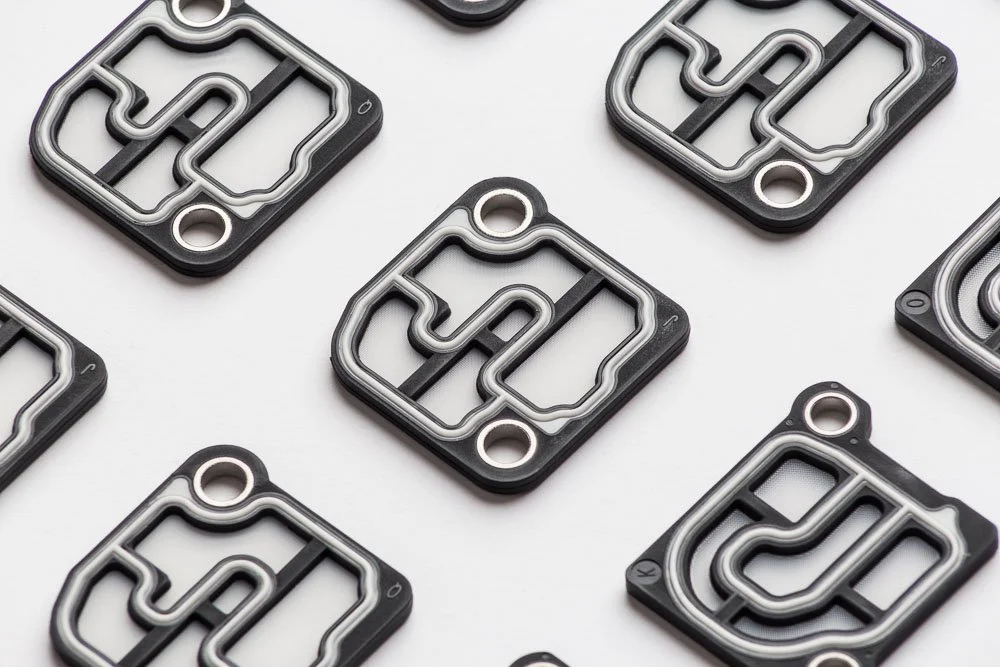LSR vs. HCR: Understanding materials for Electrical Connectors
A group of electrical connectors manufactured in Mexico
Manufacturing electrical connectors for automotive applications demands the use of materials that can withstand harsh conditions. Silicone (VMQ) is commonly used to mold electrical connectors, and it we typically use either the liquid form of Silicone (LSR) or we use High Consistency Rubber (HCR). This article explores the notable qualities of LSR and HCR and their respective uses in molding electrical connectors.
LSR (white material) molded onto a black plastic carrier
Distinctive Qualities of LSR and HCR
1. Material Composition
LSR is a two-part liquid elastomer composed of silicone polymers. The two components of LSR are mixed together using a precision liquid metering system. It is then injected into a mold as a liquid and vulcanizes (cures) in the mold at elevated temperatures to complete the cross-linking of the rubber. LSR exhibits excellent chemical resistance, thermal stability, and dielectric insulating properties.
HCR encompasses a wide range of elastomeric materials that require heat and vulcanization agents to solidify. Common HCR materials for electrical connector seals include VMQ (Silicone), FVMQ (Fluorosilicone), Nitrile (NBR), Fluorine rubber, acrylate rubber, and hydrogenated nitrile (HNBR).
2. Process Versatility
LSR is typically injection-molded, and the liquid state of the polymer allows for intricate and precise seal designs, making it ideal for complex electrical connector shapes. It also has the advantage of a shorter cure cycle, which improves manufacturing efficiency and throughput. LSR is a good choice for high-volume applications where automation can be implemented in the molding process.
Raw material HCR Silicone
HCR electrical connector seals are produced using compression or transfer molding, which can limit the complexity of the seal design. The cure cycle of HCR materials is longer than LSR, impacting the shots per hour for these applications.
3. Temperature Resistance
LSR exhibits excellent thermal stability, remaining flexible and functional within a broad temperature range. It is suitable for under-the-hood automotive applications where both high and low-temperature specifications are required to meet the automotive environment where the seal must function.
The temperature resistance of HCR materials depends on the specific rubber compound used. Some HCR materials may have lower heat resistance than LSR, but this is material-specific.
4. Environmental Resistance
LSR has exceptional resistance to UV radiation, ozone, and chemical exposure. It maintains its properties over extended periods in harsh environments, which is advantageous for outdoor automotive applications.
The environmental resistance of HCR gaskets is highly variable based on the rubber compound used, and it may not be as universally applicable as LSR.
5. Electrical Insulation
LSR is an excellent electrical insulator, making it suitable for electrical connectors. The dielectric nature of LSR eliminates the risk of electrical shorts and maintains signal integrity.
The electrical insulating properties of HCR materials can vary, depending on the specific rubber compound.
Uses in Manufacturing Automotive Gaskets for Electrical Connectors
1. LSR Applications
LSR gaskets are well-suited for automotive electrical connectors, especially in critical areas where environmental sealing, thermal stability, and electrical insulation are crucial. LSR's high precision in molding and quick curing process makes it suitable for intricate connector designs. Specific LSR grades may be used in wire seals and connector gaskets to maintain signal integrity and protect against moisture, dust, and temperature fluctuations.
2. HCR Applications
HCR gaskets are used in applications where the seal's design may not be as intricate and requires improved fluid resistance versus LSR. HCR may be a more cost-effective option in certain applications where the demanding properties of LSR are not required.
Which material is “best” for Electrical Connectors?
The choice between LSR and HCR should be based on the application's specific requirements, considering factors such as temperature, environmental exposure, precision in molding, and electrical insulation. At Morgan Polymer Seals, our focused factory “Premium Seals” specializes in manufacturing electrical connectors for automotive, aerospace, and other applications. Our engineers’ decades of experience help support quality design, testing, manufacturing, and inspection for millions of gaskets and seals each year. Watch this 3-minute video to see how we use LIM presses to mold with Liquid Silicone Rubber in Mexico.
Leak Testing shown at 1:28



